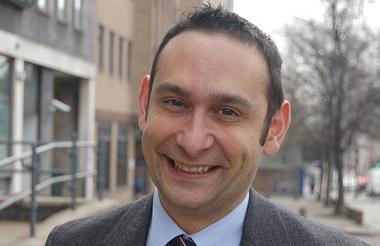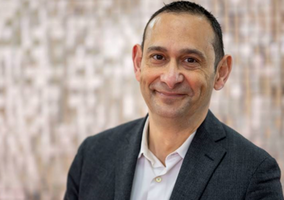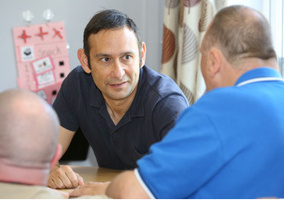At the end of January, Richard Kramer celebrates his birthday. This year, he will also mark the occasion by retiring as a charity chief executive after leading Sense for six and a half years.
Kramer has moved from London to Cornwall, where he will work two days a week as a non-executive director at Royal Cornwall Hospitals NHS Trust. He also plans to spend more time with his partner and “dance with life” together.
After a charity career spanning three decades, Kramer says he has learnt that leading a voluntary organisation is hard but that while leadership in the sector has evolved, fresh approaches need to be adopted more widely.
New ways of working
Kramer first volunteered as a schoolboy in the 1980s at Harperbury Hospital in Hertfordshire, a site built on the remains of World War 1 hangers that supported people with learning disabilities.
Reflecting on that role, he says: “It really struck me how decisions were made on behalf of groups of people, rather than supporting people to make their own choices.”
As a person with disabled family members, Kramer was also inspired to set up a youth club for disabled and non-disabled people in north London.
Despite his early experience of working with disabled people, Kramer initially trained as a solicitor before he “fell back on working in the voluntary sector” for what ended up being 25 years including stints at NCVO, Mencap and Turning Point.
Kramer joined Sense in 2013, initially as deputy CEO before being promoted to his current role in 2018.
During his tenure, Sense repositioned itself from specifically being a deafblindness charity to one that supports children and adults with complex disabilities more generally.
Kramer says the charity now has stronger brand awareness but wishes he could have invested more into building its profile as well as its data systems and technology.
Looking back on his time at Sense, Kramer says his biggest challenge was steering the disability charity through the Covid-19 pandemic and then the cost-of-living crisis, both of which have led to a “shift in leadership”.
“It demanded new ways of working, new forms of innovation, being more flexible, adaptable and open and listening more.
“And I think a good leader is one that has embraced that power shift in leadership that we see, and I hope I’ve tried to role model that during my time at Sense, because the most important thing for me is to build an inclusive culture where people feel that they have a sense of belonging.”
‘We’re not very good at collaboration’
However, Kramer says many charities and their leaders are failing to shift their approaches and collaborate as much as they should.
“I think the sector is not very good at working with one another. We’re not very good at collaboration. We like to talk about collaboration, and we might have a meeting with someone, and then, we say ‘wonderful to speak hashtag collaboration, box is ticked’. But that doesn’t mean that.
“Collaboration is working together. It’s hard. It might involve giving up a share in your market or a percentage of a grant. It’s about putting the interests of your organisation to one side in the common interest of the other organisations and the people you support, and it’s great when you get it right.”
He gives an example of the Digital Services Consortium made up of 12 major charities including Sense, which recently secured funding to support 25,000 children, young people and families with equipment, data and an online services to improve people’s emotional wellbeing.
“We did that as a coalition, as a collaboration, putting aside our own organisational territories, to share good practice of what works and come together to put a bid with multiple funding partners.
“You see collaboration in the policy environment and campaigning, but you rarely see that in terms of service provision.
“I think national charities particularly are much too competitive, and when the competitive gene kicks in, collaboration doesn’t happen. And really, we need to rethink the way that we relate to each other as large charities, because some charities may excel in research, others in art and sport, some in programmes that tackle loneliness, we should be coming together.”
This failure to collaborate includes disability charities, he says.
“We compete with one another, and actually, the biggest barrier to tackling loneliness is often the territorial barriers that organisations and CEOs put in place to prevent organisations from working together and extending their reach to disabled people. So there’s a lot more to be done.”
Kramer says the change in approach must come from the top.
“Unfortunately, too many CEOs are hardwired to be competitive and to work in silos. And we talk about collaboration, but shifting that is something we all need to work on, and it needs to be beyond a conversation. It involves action.
“Sometimes it doesn’t work and you will be disappointed. But actually, if you give it your best shot, you will reap dividends, and that’s a change in culture that all CEOs need to embrace.”
Lagging behind other sectors on EDI
Kramer is equally critical of charities’ progress on equity, diversity and inclusion (EDI), which he says lags behind the public and private sectors particularly when it comes to supporting staff.
“I think organisations in the voluntary sector, are pretty lamentable around championing diverse and inclusive cultures, and we’re all very good at amplifying the voices of the people we support, but we don’t with staff, and I think there’s a number of reasons for that.
“Diversity is a really good thing, but the voluntary sector is very solemn about it, when actually people from different backgrounds bring fresh ideas, a different approach – we can be far more creative and more innovative, but that’s ignored.
“Also, people think of EDI rather than inclusion. If we focus exclusively on EDI, we risk disengaging people, or we focus on tick box exercises, or we perpetuate that EDI is only for those who have protected characteristics, whilst inclusion and diversity is for everyone.”
Three years ago, Kramer was widely praised for writing openly about his history of depression, which he did to encourage a wider discussion about mental health.
Referring to his own mental wellbeing, Kramer says: “So many people wrestle with being different and not feeling a sense of belonging. No one is immune. So let’s look at inclusion differently and let’s not think it’s too difficult or I can’t do it, or I don’t know what to do after I set up an employee network.
“It’s about building inclusion in everything you do, in your culture, in your leadership, in your strategy. It’s about not using the word EDI so much and talking about inclusive cultures, where everyone has a grasp in being in connection with their organisation. I think too many charities shy away from that.
“That’s why the voluntary sector lags behind the private sector, and the public sector, both in terms of EDI in its narrow concept, and in building inclusive cultures. We should be at the forefront of it, because we talk about being person-centred and putting that cause at the front, and yet we neglect to include the staff that we represent, and we also don’t focus enough on wellbeing.”
Kramer is pleased with the progress Sense has made in this regard, creating an “open, collaborative, supportive environment where staff look out for each other”.
Handing over the reins
Despite the progress made, Kramer leaves Sense at a difficult time, with increasing costs on the horizon.
Sense estimates that the increase in employers’ national insurance contributions in April will mean its costs grow by up to £2.5m, with minimum wage rises set to add further financial pressure.
As charity bodies work with the government on the Civil Society Covenant, designed to “reset” the relationship between the state and the sector, Kramer says a change in commissioning is needed.
“I think we really need to stop the protracted 12-month discussions with commissioners on negotiating fee increases.
“Commissioners should be able to increase fees based on increases in the national minimum wage, and do that in a timely way, so that the relationships between commissioners and the charity sector is of equal partners, thinking about the quality of the service provision, rather than how much are commissioners prepared to pay.”
Kramer has begun the handover process with his successor James Watson-O’Neill, who is due to join from deaf health charity SignHealth on 4 February.
Watson-O’Neill is set to be the first disabled CEO of Sense, which was registered in 1961 by two mothers – Margaret Brock and Peggy Freeman – of children who were born deafblind.
“One of the key things about why James’s appointment is so good is that innovation and development should remain part of every organisation, but never at the expense of neglecting the heartbeat, the cause of your organisation.
“And that means recognising that what worked 70 years ago is relevant today and why Sense has this intrinsic strength is because it was founded more than 70 years ago from a conversation between two mums who were isolated and worried about their children, and our unifying thread is supporting people to overcome barriers and to live their best lives possible. James gets that completely and that’s an important strength to have.”
Related articles












